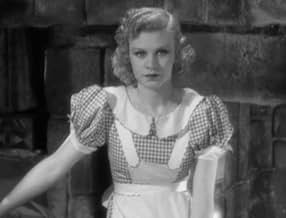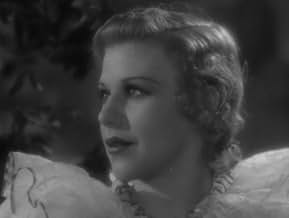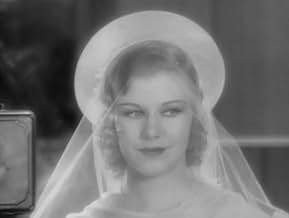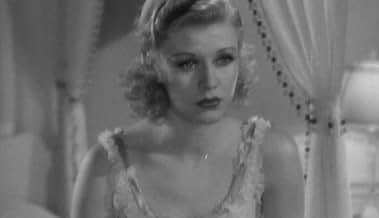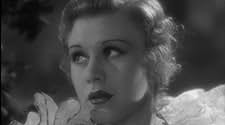AVALIAÇÃO DA IMDb
6,0/10
786
SUA AVALIAÇÃO
Una cantante de radio sin vicios quiere vivir el lado oscuro de la vida, por lo que un agente de prensa convence a su patrocinador de que elija a una «novia profesional» de entre sus fans.Una cantante de radio sin vicios quiere vivir el lado oscuro de la vida, por lo que un agente de prensa convence a su patrocinador de que elija a una «novia profesional» de entre sus fans.Una cantante de radio sin vicios quiere vivir el lado oscuro de la vida, por lo que un agente de prensa convence a su patrocinador de que elija a una «novia profesional» de entre sus fans.
- Direção
- Roteirista
- Artistas
- Prêmios
- 1 vitória no total
William Bailey
- Reporter
- (não creditado)
June Brewster
- Jim Kelsey's Secretary
- (não creditado)
Kernan Cripps
- George - Radio Station Desk Man
- (não creditado)
Betty Furness
- Blonde Reporter
- (não creditado)
Winter Hall
- Minister
- (não creditado)
Theresa Harris
- Vera - Glory's Maid
- (não creditado)
Grace Hayle
- Fat Reporter
- (não creditado)
Avaliações em destaque
The early scenes in this 1933 RKO quickie are genuinely funny, as we are introduced to "Ipsy-Wipsy, the washcloth of dreams" and its spokeswoman, the Purity Girl. There's a strong cast and some clever repartee. Unfortunately it all starts to peter out around halfway through, hurt by an unconvincing romance between the leads, a convoluted plot that doesn't seem to know how it should end, and a less-than-breakneck pace.
Mainly of interest to fans of Ginger Rogers and the well-stocked cast of bit players who surround her.
Mainly of interest to fans of Ginger Rogers and the well-stocked cast of bit players who surround her.
This is a very early film in the career of Ginger Rogers. It is somewhat saucy and always goofy. It portays people in radio show business and the press that covers it as both overly ambitious and naive. There are several character actors such as Zazu Pitts that are totally hilarious. The plot is basicly girl wants fun and freedom rather than fame, and boy wants girl. After several very funny misadventures they both get what they want and each other. Sexuality is very frank in this movie even though the characters are very innocent. For the naughty in us there is even a spanking scene. Ginger Roger's voice is dubbed in a couple of songs because the producers did not think she was good enough. A very funny film worth repeated viewings. It can be seen occaisionly on the Turner Movie Channel. In the final scene there is a reference to television long before it would become available as if it was just around the corner.
Ginger Rodgers shines in a role that might have been written for Jean Harlow. She cracks wise, hurls insults, and dances around in her underwear. Zazu Pitts is priceless as the gushing and gullible small town reporter. Franklin Pangborn is more blatantly gay here than we normally get to see him. This movie touches on many aspects of celebrity that remain true to this day. The manipulation of a public image and the team of professionals that that requires. The all important "product", the selling of which is the reason for everything. This movie is also amazingly tolerant and socially progressive for it's time. The attractive black housekeeper's character is more of a friend to Ginger, who's footloose lifestyle she envies. Pangborn's character as one of her handlers is made obviously gay without degradation or judgement. Don't expect "Dinner at Eight", but "Professional Sweetheart" is sparkling and breezy pre-code fun!
"Professional Sweetheart" was Ginger Rogers' first film for RKO studios after she left Warner Bros., and with Allen Jenkins and Frank McHugh in the supporting cast it almost seems like a Warners film in exile. It's a marvelous movie, smart and funny, with a script by "Chicago" author Maurine Watkins that, though it isn't a crime story, takes up another of Watkins' favorite themes: media manipulation and the gap between what we're told about celebrities and what they're really like. In "The Fred Astaire and Ginger Rogers Book," Arlene Croce wrote, "Almost any Ginger Rogers role is successful to the degree that it reflects the dualism in her personality (tough-vulnerable, ingenuous-calculating) or plays on her curious aptitude for mimickry or fantasy or imposture." Croce was writing about the major roles of her post-Astaire career "Bachelor Mother," "Tom, Dick and Harry," "The Major and the Minor" but it applies here just as well; by casting Rogers as a wise-cracking hard-bitten orphan girl forced to pose as the "Purity Girl," and having two radio sponsors and a husband (from an arranged marriage!) all with their own ideas of what they want from her, "Professional Sweetheart" gives Rogers an early showcase for the characteristics that would have made her an enormous star even if she'd never set foot on a dance floor with Fred Astaire. I can't understand why some of the other commentators on this film have criticized Watkins' script, since it seems to me to be well constructed and vividly satirical on celebrity and its discontents in a way that rings true even today.
Another thing I liked about "Professional Sweetheart" is that it's one of the Gayest movies Hollywood ever made so much so that I can't understand why TCM isn't showing it in their current "Screened Out" festival of Gay and Lesbian films when some other titles with much more peripheral Gay content did make their list. The supporting actors seem to be competing as to who can be the queeniest, with Franklin Pangborn (not surprisingly) winning: his looks of horror and disgust when any of the other characters suggests that he date a woman are priceless. Also pretty astonishing, even for the relatively liberal "pre-Code" era in Hollywood history, is Sterling Holloway's obviously cruising Allen Jenkins at the reporters' reception imagine a Gay scene involving Jenkins in which he's the butch one!
Another thing I liked about "Professional Sweetheart" is that it's one of the Gayest movies Hollywood ever made so much so that I can't understand why TCM isn't showing it in their current "Screened Out" festival of Gay and Lesbian films when some other titles with much more peripheral Gay content did make their list. The supporting actors seem to be competing as to who can be the queeniest, with Franklin Pangborn (not surprisingly) winning: his looks of horror and disgust when any of the other characters suggests that he date a woman are priceless. Also pretty astonishing, even for the relatively liberal "pre-Code" era in Hollywood history, is Sterling Holloway's obviously cruising Allen Jenkins at the reporters' reception imagine a Gay scene involving Jenkins in which he's the butch one!
I saw this with another RKO Ginger Rogers film from the same year.
Even though these are targeted as light entertainment, I am amazed at how fresh they feel and how experimental the structure is.
That lightness is often attributed to the lack of the Hayes Code, which lowered its dark curtain the following year. Its clear in retrospect that this was a bad thing, that it wounded an entire society, and would have destroyed it altogether had we not encountered a similar more obvious evil. And went to war.
But how does one know what is right around the corner? How does one celebrate the freedoms that are about to be taken away? Its a haunting thing in the background of this, as part of the joke is that this perfect man is "the purest of Anglo-Saxons." Another part of the joke is that sweetness, goodness and happiness is contrasted with black jive, sex and Harlem, all of which are "fun."
The structure of the thing is pretty sophisticated. Many films from these four years 1930- 33 were similarly adventuresome in their structure.
Its a show about sex and domestic values within which is a show (a radio show) about sex and domestic values. (The domestic hook is literally a dishrag.) Around this show are a collection of nattering men trying to engineer romance and predictably failing. If you study the narrative structure of date movies, you'll be familiar with tricks about how to reflect the viewer in the story. Its rather novel and somewhat perfect here.
Ted's Evaluation -- 3 of 3: Worth watching.
Even though these are targeted as light entertainment, I am amazed at how fresh they feel and how experimental the structure is.
That lightness is often attributed to the lack of the Hayes Code, which lowered its dark curtain the following year. Its clear in retrospect that this was a bad thing, that it wounded an entire society, and would have destroyed it altogether had we not encountered a similar more obvious evil. And went to war.
But how does one know what is right around the corner? How does one celebrate the freedoms that are about to be taken away? Its a haunting thing in the background of this, as part of the joke is that this perfect man is "the purest of Anglo-Saxons." Another part of the joke is that sweetness, goodness and happiness is contrasted with black jive, sex and Harlem, all of which are "fun."
The structure of the thing is pretty sophisticated. Many films from these four years 1930- 33 were similarly adventuresome in their structure.
Its a show about sex and domestic values within which is a show (a radio show) about sex and domestic values. (The domestic hook is literally a dishrag.) Around this show are a collection of nattering men trying to engineer romance and predictably failing. If you study the narrative structure of date movies, you'll be familiar with tricks about how to reflect the viewer in the story. Its rather novel and somewhat perfect here.
Ted's Evaluation -- 3 of 3: Worth watching.
Você sabia?
- Curiosidades"Professional Sweetheart" was Ginger Rogers' first film for RKO and - ironically, since so much of the plot revolves around getting Rogers' character to sign a radio contract - she had not yet signed a long-term contract with RKO when she made this film. She would sign a contract with the studio later in the year, just before making Voando para o Rio (1933), her first film with Fred Astaire.
- Erros de gravaçãoWhile undressing in her bedroom, Miss Glory complains she's not allowed to wear any makeup when she is very plainly wearing excessive amounts of makeup, including lipstick and heavy black eye makeup, in that scene.
- Citações
Glory Eden: I wanna sin and suffer, and now I'm only sufferin'.
- ConexõesFeatured in The Love Goddesses (1965)
- Trilhas sonorasMy Imaginary Sweetheart
(uncredited)
Music by Harry Akst
Lyrics by Edward Eliscu
Performed first by Ginger Rogers (dubbed by Etta Moten)
Performed later by Theresa Harris
(who may have been dubbed by Etta Moten)
Principais escolhas
Faça login para avaliar e ver a lista de recomendações personalizadas
Detalhes
- Data de lançamento
- País de origem
- Idioma
- Também conhecido como
- Professional Sweetheart
- Locações de filme
- Empresa de produção
- Consulte mais créditos da empresa na IMDbPro
- Tempo de duração
- 1 h 13 min(73 min)
- Cor
- Proporção
- 1.37 : 1
Contribua para esta página
Sugerir uma alteração ou adicionar conteúdo ausente

